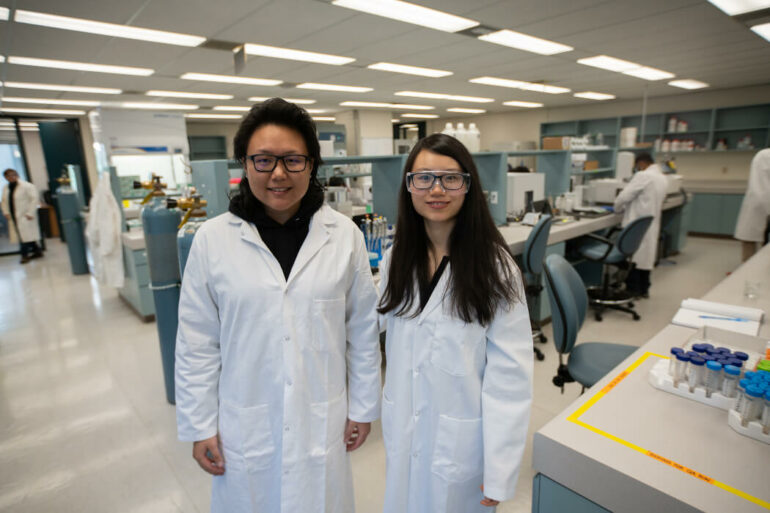Toronto-based cleantech startup Genecis Bioindustries is receiving funding from Amazon as part of an investment that could lead to the e-commerce giant becoming a Genecis customer.
Amazon has invested in Genecis through its Climate Pledge Fund. Both companies declined to disclose the exact figure to BetaKit. Amazon is also “currently evaluating” how to deploy Genecis’ technology within its sprawling online retail operations, in what could mark a big customer win for the emerging Canadian bioplastic firm.
“Investing in solutions like Genecis’ bioplastics is part of Amazon’s broader strategy to reduce single-use plastic.”
“In the future, Genecis bioplastics could potentially offer Amazon customers the opportunity to receive grocery and pharmacy items in bioplastics packaging that is both biodegradable and easily recyclable,” Amazon Climate Pledge Fund investment partner Phoebe Wang told BetaKit. “We’re still in the early stages of exploring these opportunities, but we’re excited for the possibilities.”
Traditional plastics, which are made with petroleum, represent a significant source of global pollution. According to the American Chemical Society, nearly 400 million metric tons worth of plastics are produced every year using fossil fuels, and most end up in landfills.
Genecis aims to address this problem by converting food waste into bioplastics, a biodegradable alternative to conventional plastic that can be used to create a variety of packaging and products. Founded in 2017 by CEO Luna Yu while she was studying to be an environmental scientist, Genecis uses specialized bacteria to convert organic waste, including bread crusts and other food scraps, into biodegradable bioplastics that can be used to make everything from food packaging to clothing and textiles.
Amazon launched its $2 billion USD Climate Pledge Fund in 2020. The cleantech-focused corporate venture capital program aims to support the development of sustainable technologies and services that will help Amazon meet its net-zero carbon goal. An Amazon spokesperson told BetaKit that Climate Pledge Fund investments vary by amount and stage of company, ranging from “hundreds of thousands in seed and early-stage investments, to multimillion-dollar investments.”
The Climate Pledge Fund has earmarked $50 million to invest in female entrepreneurs and help address the funding gap that exists for women in climate tech. Genecis marks the first startup to receive investment through this Female Founder Initiative. Genecis also represents the Climate Pledge Fund’s first investment in a firm directly addressing the use of fossil fuel-derived plastics.
RELATED: Amazon layoffs hit Canadian teams, according to LinkedIn posts
Amazon is also implementing tech from another Canadian company it has backed through its Climate Pledge Fund. Amazon has also invested in Dartmouth-based cleantech startup CarbonCure Technologies, which uses carbon removal technology to trap CO2 in concrete, reduce the amount of cement needed, and lower the carbon footprint of buildings. Wang told BetaKit that Amazon is currently using CarbonCure’s concrete in construction sites around North America, including its HQ2 headquarters in Arlington, Virginia.
As one of the world’s largest retailers, Amazon has a sizeable plastic packaging footprint. A December 2022 report by ocean conservation nonprofit Oceana found that Amazon generated an estimated 709 million pounds of plastic packaging waste globally in 2021, an 18 percent increase from the previous year. Amazon’s own estimate regarding the firm’s plastic packaging footprint in 2021 came in at about 214 million pounds, under a third of the amount calculated by Oceana.
Amazon principal materials scientist Alan Jacobsen said that “investing in solutions like Genecis’ bioplastics is part of Amazon’s broader strategy to reduce single-use plastic.”
A recent study by Back to Blue warned that without significant policy interventions, global plastic consumption could nearly double by 2050. For its part, Canada aims to produce zero plastic waste by 2030, and the country has already begun banning some single-use plastics, including grocery bags, straws, and Styrofoam containers. As BNN Bloomberg reported in December, a global treaty to address the issue of plastic pollution is coming soon, which could stand to benefit both the environment and bioplastics firms like Genecis.
RELATED: BDC commits $400 million for second cleantech-focused fund
According to Yu, Genecis typically partners with clients by custom-designing polyhydroxyalkanoate (PHA)-based polymers and products that meet the material specifications of oil-based polymers or products currently in use in a partner’s supply chain.
“PHA is biodegradable and compostable, and able to meet the same technical specs as traditional plastics, making it a sustainable choice for active packaging or product development,” Yu told BetaKit.
In August 2022, Genecis secured $7 million USD in Series A funding led by Khosla Ventures and BDC Capital through its second cleantech fund. The Y Combinator graduate also nabbed an additional $3 million credit facility from Silicon Valley Bank.
Since then, Yu said Genecis has grown its team to 45 employees and beta-launched its first product, socks using PHA-infused fibres, with plans to release more PHA offerings this year. The company also moved into a new, nearly 8,000-square-foot lab in downtown Toronto last year, expanding its research and development capabilities and capacity to partner with new prospects for polymer and product development.
Genecis plans to use its latest funding from Amazon to help develop its waste-to-PHA fermentation tech, scale its demonstration facility with Canadian biogas Stormfisher, and boost its PHA production.
Feature image courtesy Genecis.


